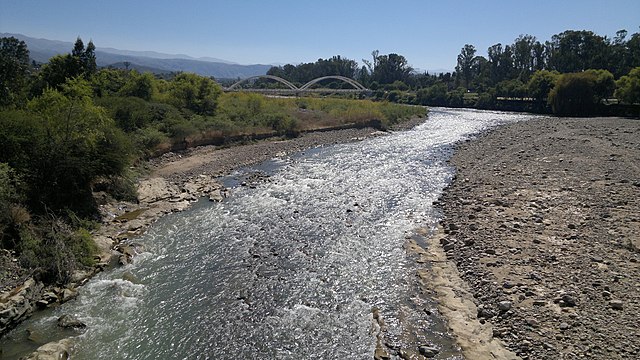Tarija Department
Department of Bolivia From Wikipedia, the free encyclopedia
Department of Bolivia From Wikipedia, the free encyclopedia
Tarija (Spanish pronunciation: [taˈɾixa] ) is a department in Bolivia. It is located in south-eastern Bolivia bordering with Argentina to the south and Paraguay to the east. According to the 2024 census, it has a population of 534,348 inhabitants. It has an area of 37,623 km2 (14,526 sq mi). The city of Tarija is the capital of the department.
This article needs to be updated. (January 2019) |
Tarija
Departamento de Tarija (Spanish) | |
|---|---|
 | |
| Motto(s): ¡La Muy Leal y Muy Fiel! (The very loyal and very faithful!) | |
| Anthem: Lyrics: Tomás O’Connor D'Arlach Music: Juan Fiori - starts with "Tarijeños la fama pregona...." | |
 Tarija in Bolivia | |
| Coordinates: 21°35′S 63°50′W | |
| Country | Bolivia |
| Capital | Tarija |
| Government | |
| • Governor | Óscar Gerardo Montes Barzón (UNIR [n. 1]) |
| • Lieutenant governor | Maya Soruco Urzagaste (UNIR) |
| • Senators | |
| Area | |
• Total | 37,623 km2 (14,526 sq mi) |
| • % of Bolivia | 3.42 km2 (1.32 sq mi) |
| Population (2024) | |
• Total | 534,348 |
| • Density | 14/km2 (37/sq mi) |
| Languages (speakers) | |
| • Spanish | 365,710 |
| • Quechua (migrants) | 37,337 |
| • Aymara (migrants) | 7,219 |
| • Guaraní | 4,578 |
| Time zone | UTC-4 (BOT) |
| ISO 3166 code | BO-T |
| Official language | Spanish, Guaraní, wichí-matacoa-weenhayek, tapieté |
| GDP (2023) | in constant currency of 2015[1] |
| - Total | US$ 2.2 billion Int$ 5.2 billion (PPP) |
| - Per capita | US$ 3,600 Int$ 8,300 (PPP) |
| HDI (2019) | 0.741[2] high · 3rd of 9 |
| Provinces | 6 |
| Website | Department website |

The department is divided into five provinces and one autonomous region:
Notable places in Tarija include:
The Department of Tarija is renowned for its mild, pleasant climate, and comprises one of the country's foremost agricultural regions. Its citizens have traditionally felt close to, and conducted a lively international trade with, neighboring towns of northern Argentina. Between 1816 and 1898, the region was part of Argentina, and was ceded to Bolivia in exchange for Puna de Atacama.
Tarija boasts South America's second-largest natural gas reserves. Increased gas revenues and foreign direct investment in gas exploration and distribution are fueling growth and turning Tarija into Bolivia's next industrial hub. Political instability at the national level has hindered development of the reserves, as the region has chosen to align with pro-autonomy forces which aim at the devolution of considerable powers away from the central government in favor of the departments.
More than 20 different indigenous tribes, ranging in population from 20 persons up to 1500, live in the region. The Guaraní is the largest tribe.
Important battles and events related to the 1932-35 Chaco War with Paraguay took place in the department's eastern dry lands. Tarija was the home of Víctor Paz Estenssoro, leader of the 1952 Bolivian Revolution and four-time Constitutional President.
The main economic activity is the wine industry. The land and climate are ideal for grape and wine production. The city of Tarija holds an annual Festival of Wine and Cheese.
The petroleum industry is important not only for the region but also for the country as a whole, especially the gas industry which is exported to Argentina and Brazil. The autonomous region of Gran Chaco is from where most of the gas is exploited.
| Year | Pop. | ±% p.a. | ||
|---|---|---|---|---|
| 1976 | 187,204 | — | ||
| 1992 | 291,407 | +2.80% | ||
| 2001 | 391,226 | +3.33% | ||
| 2012 | 483,518 | +1.94% | ||
| 2024 | 534,348 | +0.84% | ||
| ||||
| Source: Citypopulation[4] | ||||

The languages spoken in the department are mainly Spanish and Guaraní, And spoken by the migrants Quechua and Aymara. The following table shows the numbers belonging to the recognized groups of speakers. [5]

Seamless Wikipedia browsing. On steroids.
Every time you click a link to Wikipedia, Wiktionary or Wikiquote in your browser's search results, it will show the modern Wikiwand interface.
Wikiwand extension is a five stars, simple, with minimum permission required to keep your browsing private, safe and transparent.